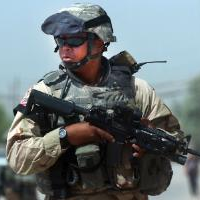In a recent World Politics Review article, U.S. Army Col. Gian Gentile declared that COIN is "dead" as the motivating intellectual concept for the U.S. Army. Although combat continues in Afghanistan, to some extent guided by the precepts set forth in the Army’s “Field Manual 3-24: Counterinsurgency,” Gentile argues that the inability of COIN doctrine to produce a definitive outcome in Afghanistan, along with the end of fighting in Iraq, serves to render the school of thought obsolete. Indeed, Gentile argues that the Army should abandon the “search for lessons of strategic value from the past 10 years of counterinsurgency warfare,” and instead focus on developing capabilities to achieve victory at every level of escalation.
Gentile has been a critic of the COIN faction of the U.S. Army for some time. In “The Gamble,” an account of the decision-making leading up to the Iraq Surge in late-2006, Tom Ricks was critical of Gentile’s attitude about the Surge. Nevertheless, Gentile has written eloquently about the shortcomings of FM 3-24 and about the strategic insufficiency of the COIN project. Gentile has also argued that the changes enacted during the Surge have been oversold by COIN advocates and that the actual shifts in U.S. Army behavior were relatively minor. Others, both inside and outside the Army, disagree with this assessment, pointing to much wider changes in Army practice.
Over the years, a number of analysts opposed to the escalation of U.S. forces in Afghanistan adopted elements of Gentile’s rhetoric. To many outside observers, Gentile seemed to represent an effective internal critique of a COIN doctrine that appeared to justify an endless U.S. engagement in Afghanistan. Counterinsurgency advocates were explicit about the necessity for long deployments of large numbers of troops, accompanied by expensive development projects and elaborate training programs for indigenous forces. The doctrine seemed to imply that the United States would need to step up efforts in Afghanistan in order to defeat the Taliban, and it was held responsible by some for the “surge” of forces into Afghanistan in the second year of the Obama administration.

